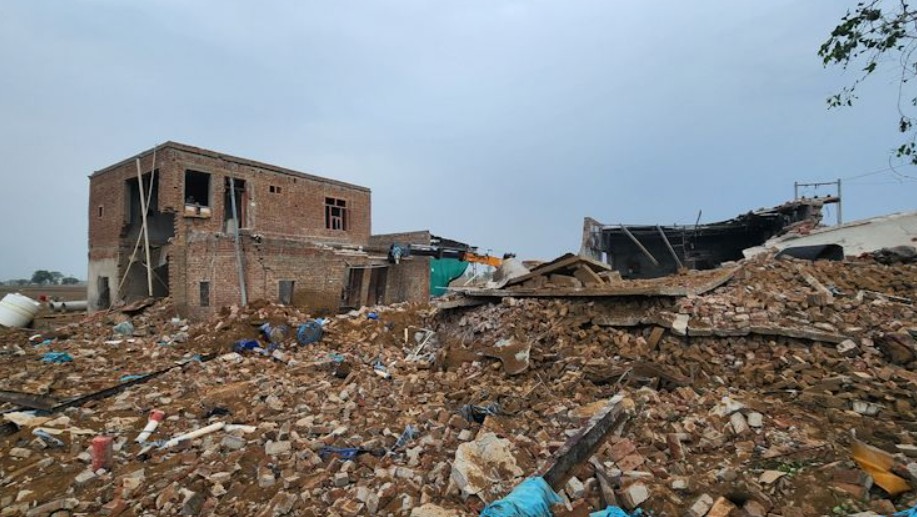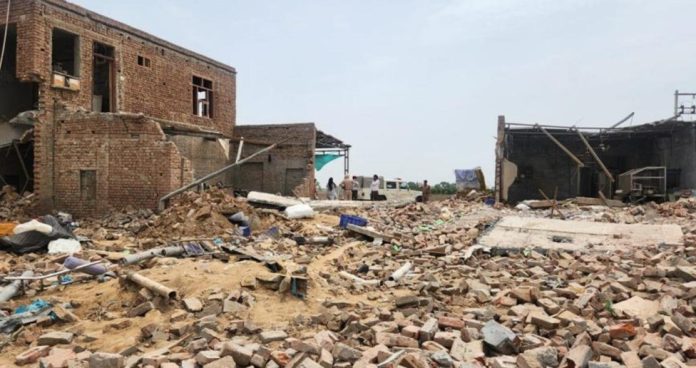A pall of grief and outrage hangs heavy over Muktsar district following the devastating blast at an illegal firecracker factory in Fatuhiwala village, near Lambi, an incident that tragically claimed the lives of five migrant workers and left nearly 30 others injured. While the human cost of the catastrophe is undeniable, what has amplified the anguish and fueled public distrust is the conspicuous absence of a specialized investigation team and the growing allegations from grieving families and opposition leaders that there is a deliberate attempt to shield culpable officials from accountability. This tragic event, now marred by accusations of bureaucratic apathy and systemic corruption, has cast a harsh light on the unregulated industrial units operating in plain sight across Punjab.
The powerful explosion, which occurred in the early hours of Friday, May 30, 2025, around 1 AM, was of such intensity that it reportedly rattled windows up to ten kilometers away. The two-story factory building, nestled in a residential area, was instantly reduced to a heap of rubble, trapping dozens of workers, primarily migrant laborers from Uttar Pradesh and Bihar, who were either engaged in production or sleeping on the premises. The initial hours were a chaotic scramble of frantic rescue operations, with police, locals, and volunteers from organizations like Dera Sacha Sauda tirelessly sifting through the debris to pull out bodies and survivors. The injured, many with severe burns and crush injuries, were rushed to nearby hospitals, including AIIMS Bathinda and the Civil Hospital in Badal village, fighting for their lives. The scene of devastation was not just physical; it was a stark reminder of the rampant disregard for human life and safety norms that plagues many unmonitored industrial operations in the region.
In the aftermath of such a large-scale industrial disaster, particularly one involving an illegal operation and significant loss of life, it is customary for state authorities to constitute a Special Investigation Team (SIT). An SIT typically comprises officers from various specialized departments, often including forensic experts, fire safety officials, labor department representatives, and independent legal minds, to ensure a thorough, impartial, and comprehensive probe. Such a team’s mandate extends beyond merely identifying the immediate cause of the blast or arresting the factory owners; it delves into the systemic failures, regulatory lapses, and potential connivance of officials who might have overlooked, ignored, or even facilitated the illegal operation.

However, in the Muktsar blast case, the absence of such a high-level, independent investigation team has become a focal point of criticism. The ongoing probe remains primarily with the local police, who have arrested the factory owner, Tarsem Singh (reportedly an Aam Aadmi Party activist), his son Navraj Singh, and a labor contractor, Raj Kumar. While these arrests are a necessary first step, critics argue that a local police investigation, no matter how sincere, often lacks the specialized resources, the multi-departmental coordination, and crucially, the independence required to probe the nexus between illegal operators and the regulatory authorities responsible for ensuring compliance. The very officials who might be implicated in negligence or corruption could potentially influence or limit the scope of an internal police inquiry, leading to what many fear will be a whitewash.
The accusation that the government is attempting to save “big fish” and shield negligent officials is not merely speculative; it stems from a pattern of alleged inaction and a lack of transparency. Opposition parties, particularly the Shiromani Akali Dal (SAD), have been vociferous in their demands for a high-level, impartial inquiry. SAD president Sukhbir Singh Badal, after visiting the injured, lambasted the state government, alleging that the illegal factory was running under “political patronage” and that the district administration and other relevant departments had turned a blind eye to its operations. He highlighted the glaring absence of fire safety measures and the deplorable fact that even minors were reportedly employed at the site, further solidifying the narrative of a systemic failure driven by corruption or negligence.
The core of the allegation rests on the premise that such an illegal and dangerous operation, especially one handling highly explosive materials, could not have functioned for an extended period without the knowledge, or at least the willful ignorance, of local police, labor department officials, fire safety inspectors, and the district administration. The factory owner had reportedly even submitted an application for an official license under the Explosives Rules, 2008, which was still pending. This raises critical questions: Why was it allowed to operate without permission while the application was under process? Were there any inspections? What mechanisms are in place to ensure compliance with the Factories Act and Explosives Act? The lack of a specialized team, empowered to summon and question officials from various departments and delve into their records, creates an impression that the inquiry will be confined to the factory owners, deliberately overlooking the institutional complicity that enabled the tragedy.
The Muktsar blast is not an isolated incident in Punjab or across India. Firecracker factory explosions, often in illegal or poorly regulated units, are a recurring tragedy, invariably highlighting similar systemic failures: lack of valid licenses, storage of excessive and unauthorized raw materials, operating in congested or residential areas, absence of safety equipment, and the exploitation of vulnerable, often migrant, labor. Each such incident exposes a lax regulatory environment where oversight bodies consistently fail to enforce safety norms, often due to a nexus between powerful owners and local officials who benefit from such illicit operations.
For the victims and their families, the lack of a comprehensive and impartial investigation means justice remains elusive. Beyond the initial ex-gratia compensation and free medical treatment, they seek accountability not just from the factory owners but from the entire chain of command that allowed such a death trap to operate. The fear and insecurity among residents living near similar unregulated units persist, as they witness how, even after a massive tragedy, the state machinery appears hesitant to conduct a full-scale, unsparing inquiry that could genuinely fix accountability and prevent future recurrences.
The public outcry for a special team is a demand for systemic reform, a call to dismantle the opaque networks that allow such dangerous operations to flourish. Without a robust and independent investigation that probes beyond the immediate perpetrators, the Muktsar blast risks becoming another statistic, its victims’ cries for justice drowned out by bureaucratic inertia and alleged cover-ups, reinforcing the perception that in Punjab, when tragedy strikes due to official negligence, the wheels of justice are deliberately slowed to protect those in power.


